| Srl | Item |
| 1 |
ID:
190987
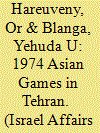

|
|
|
|
|
| Summary/Abstract |
As a close ally of Shah Muhammad Reza Pahlavi, Israel participated in the September 1974 Asian Games – the ‘Asian Olympics’ – that were held in Tehran. Among the 18 sports in which athletes competed, football attracted the most attention, especially after Iran’s historic victory over Israel in the AFC Asian Cup in 1968. As both countries reached the final of the Games’ football tournament, the match came to be seen by Iranians as nothing short of war. Standing in stark contradiction to the close and multifaceted relations between Jerusalem and the monarchical regime, this public attitude was lost on Israeli decisionmakers in what foreshadowed the failure to anticipate the Islamic revolution and the attendant collapse of Iranian-Israeli relations five years later.
|
|
|
|
|
|
|
|
|
|
|
|
|
|
|
|
| 2 |
ID:
192277
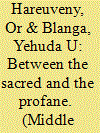

|
|
|
|
|
| Summary/Abstract |
The present article illuminates an aspect of relations between religion and society in Iran that has so far received scant scholarly attention. It describes and analyzes the interaction between religious law in Iran and football, to wit, what solutions the regime tries to find for cases in which religious law comes into conflict with the game's huge popularity, for example: how should Iran act when reaching the world finals means playing on the most solemn day of mourning in the Shiite calendar? What should female Iranian athletes do if participation in international tournaments means they would have to remove the hijab? In what way are male players allowed to celebrate a goal? May they adopt Western-style fashions (haircuts, clothes) like their counterparts elsewhere? And are superstitions, witchcraft and magic allowed in connection with the game?
|
|
|
|
|
|
|
|
|
|
|
|
|
|
|
|
| 3 |
ID:
146041
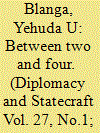

|
|
|
|
|
| Summary/Abstract |
This analysis examines one of the unknown chapters in the diplomatic history of the Arab-Israeli conflict: the French initiative of 1969 calling for diplomatic co-operation amongst the four Great Powers—the United States, Soviet Union, Britain, and France—to put an end to the conflict. The “Forum of Four” did not just attempt to mediate and achieve a compromise between Israel and the Arabs; it also presumed to define the general envelope for the agreement and dictate the path that the sides should follow toward a peace agreement. This analaysis examines the diplomatic positions of Israel, Egypt, and their superpower patrons—which conducted a “Forum of Two”—during the first months of the War of Attrition in 1969 and presents the details of the planned agreement worked out in the deliberations amongst the Powers, especially the United States and Soviet Union. It also surveys the reactions to them and the reasons why mediation failed.
|
|
|
|
|
|
|
|
|
|
|
|
|
|
|
|
| 4 |
ID:
162527
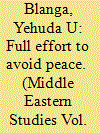

|
|
|
| 5 |
ID:
155559
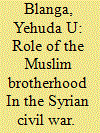

|
|
|
| 6 |
ID:
156848
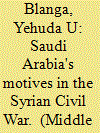

|
|
|
| 7 |
ID:
111896
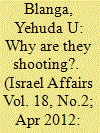

|
|
|
|
|
| Publication |
2012.
|
| Summary/Abstract |
This article examines the episode of an almost-forgotten war in the history of the Middle East conflict - the War of Attrition. While everyone agrees that the War of Attrition ended on August 7, 1970, there is controversy over when the war broke out. Some consider it to have begun in the summer of 1968 and others believe that it began with the bloody events that occurred immediately after the Six Day War. The IDF considers March 8, 1969 to be the day the war broke out because from that day on there was continuous fighting with the Egyptian side of the Suez Canal.
To show the American and Israeli failure, in the first four months of hostilities along the Suez Canal, to understand that the area was facing renewed conflict and another round of war. A direct consequence of that failure was the inability of both sides to adopt a suitable policy towards the emerging crisis. The article examines the beginning of the War of Attrition in the diplomatic arena, the Egyptian aims and objectives, and the American reaction. Other than presenting the facts, this article examines what the United States thought of the Egyptian moves, if and how much the United States was influenced by those moves, and Egyptian President Gamal Abdel Nasser's reaction to the steps taken by the Americans. Since the main focus is on the American foreign policy, most of the sources used for this article are American. In order to complete the picture, it is also important to examine the Israeli point of view and the last part will focus on that.
|
|
|
|
|
|
|
|
|
|
|
|
|
|
|
|